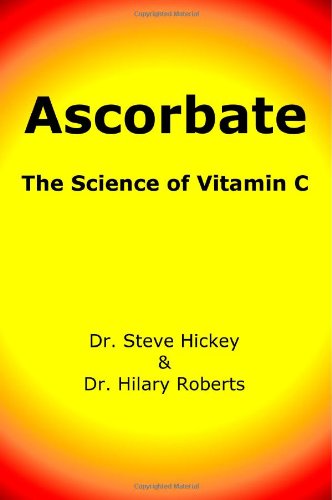Ascorbate: The Science of Vitamin C epub
Par evans timothy le mardi, décembre 13 2016, 06:46 - Lien permanent
Ascorbate: The Science of Vitamin C. Steve Hickey Hilary Roberts

Ascorbate.The.Science.of.Vitamin.C.pdf
ISBN: 1411607244,9781411607248 | 264 pages | 7 Mb

Ascorbate: The Science of Vitamin C Steve Hickey Hilary Roberts
Publisher:
CURING THE INCURABLE: VITAMIN C, INFECTIOUS DISEASES AND TOXINS Hickey/Roberts ASCORBATE: THE SCIENCE OF VITAMIN C E. Melbourne: Scientists have found that Vitamin C does not significantly lower uric acid levels in gout patients as previously believed. Vitamin C (ascorbate, ascorbic acid, AA) is a water-soluble antioxidant and essential nutrient for immune cells and extracellular matrix production [40,41]. Take a look at the book Ascorbate: the Science of Vitamin C. Vitamin C There is continuing debate within the scientific community over the best dose schedule (the amount and frequency of intake) of vitamin C for maintaining optimal health in humans. Vitamin C has been advocated for many other therapeutic uses. Vitamin C or L-ascorbic acid, or simply ascorbate (the anion of ascorbic acid), is an essential nutrient for humans and certain other animal species. Vitamin C, otherwise called ascorbate, has been found to have a link with cancerous tumour growth, according to University of Otago researchers. Researchers at Mount Sinai School of Medicine have shown that Vitamin C actively protects against osteoporosis, the findings are published in the October online edition of PloS ONE. Scientists of the era of “Better Living Through Chemistry and Science” (which we have been experiencing for the last fifty years) decided to take the discoveries about Vitamin C and“improve” on Mother Nature. Most experimental and clinical research uses ascorbic acid or sodium ascorbate. Cathcart III, Frederick Klenner, Steve Hickey and Hilary Roberts. First they found that extracting ascorbic acid from natural foods, such as the red Then they found that ascorbic acid worked better as a mineral ascorbate and they worked on that! Despite the fact that most mammals can synthesize ascorbate (Asc), humans (along with other primates, bats, and guinea pigs) are unable to make vitamin C as a result of a mutation to the gene encoding L-gulono-1,4-lactone oxidase, the last enzyme in the Asc biosynthetic pathway [1]. Note how Allan Smith was cured from his Swine Flu death bed by IV Vitamin C. Although The National Academy of Sciences has established 90 mg/day (for adult males) and 75 mg/day (for adult females) as the Recommended Dietary Allowance (RDA) for vitamin C [9]. Researchers from the University of Otago, Findings show a modest vitamin C dose for eight weeks did not lower urate levels to a clinically significant degree in gout patients, but did increase ascorbate. Vitamin C (L-ascorbic acid) is available in many forms, but there is little scientific evidence that any one form is better absorbed or more effective than another. Vitamin C does not alleviate gout: study. Poor intake of vitamin C-rich vegetables and fruits is a common contributor to vitamin C deficiency.